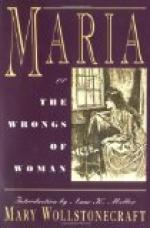“I returned to the metropolis; but the solitude of a poor lodging was inconceivably dreary, after the society I had enjoyed. To be cut off from human converse, now I had been taught to relish it, was to wander a ghost among the living. Besides, I foresaw, to aggravate the severity of my fate, that my little pittance would soon melt away. I endeavoured to obtain needlework; but, not having been taught early, and my hands being rendered clumsy by hard work, I did not sufficiently excel to be employed by the ready-made linen shops, when so many women, better qualified, were suing for it. The want of a character prevented my getting a place; for, irksome as servitude would have been to me, I should have made another trial, had it been feasible. Not that I disliked employment, but the inequality of condition to which I must have submitted. I had acquired a taste for literature, during the five years I had lived with a literary man, occasionally conversing with men of the first abilities of the age; and now to descend to the lowest vulgarity, was a degree of wretchedness not to be imagined unfelt. I had not, it is true, tasted the charms of affection, but I had been familiar with the graces of humanity.
“One of the gentlemen, whom I had frequently dined in company with, while I was treated like a companion, met me in the street, and enquired after my health. I seized the occasion, and began to describe my situation; but he was in haste to join, at dinner, a select party of choice spirits; therefore, without waiting to hear me, he impatiently put a guinea into my hand, saying, ’It was a pity such a sensible woman should be in distress—he wished me well from his soul.’
“To another I wrote, stating my case, and requesting advice. He was an advocate for unequivocal sincerity; and had often, in my presence, descanted on the evils which arise in society from the despotism of rank and riches.
“In reply, I received a long essay on the energy of the human mind, with continual allusions to his own force of character. He added, ’That the woman who could write such a letter as I had sent him, could never be in want of resources, were she to look into herself, and exert her powers; misery was the consequence of indolence, and, as to my being shut out from society, it was the lot of man to submit to certain privations.’
“How often have I heard,” said Jemima, interrupting her narrative, “in conversation, and read in books, that every person willing to work may find employment? It is the vague assertion, I believe, of insensible indolence, when it relates to men; but, with respect to women, I am sure of its fallacy, unless they will submit to the most menial bodily labour; and even to be employed at hard labour is out of the reach of many, whose reputation misfortune or folly has tainted.
“How writers, professing to be friends to freedom, and the improvement of morals, can assert that poverty is no evil, I cannot imagine.”




